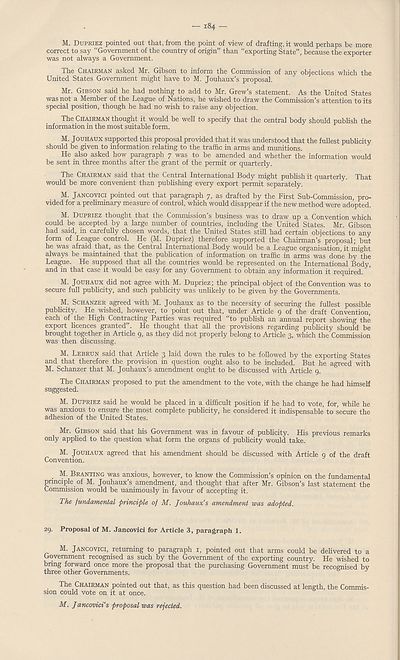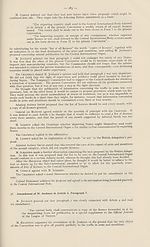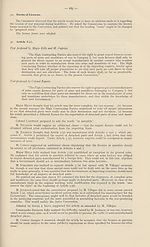Armament > Conference for the control of the international trade in arms, munitions and implements of war
(186)
Download files
Complete book:
Individual page:
Thumbnail gallery: Grid view | List view

•— 184 —
M. Dupriez pointed out that, from the point of view of drafting, it would perhaps be more
correct to say "Government of the country of origin” than "exporting State”, because the exporter
was not always a Government.
The Chairman asked Mr. Gibson to inform the Commission of any objections which the
United States Government might have to M. Jouhaux’s proposal.
Mr. Gibson said he had nothing to add to Mr. Grew’s statement. As the United States
was not a Member of the League of Nations, he wished to draw the Commission’s attention to its
special position, though he had no wish to raise any objection.
The Chairman thought it would be well to specify that the central body should publish the
information in the most suitable form.
M. Jouhaux supported this proposal provided that it was understood that the fullest publicity
should be given to information relating to the traffic in arms and munitions.
He also asked how paragraph 7 was to be amended and whether the information would
be sent in three months after the grant of the permit or quarterly.
The Chairman said that the Central International Body might publish it quarterly. That
would be more convenient than publishing every export permit separately.
M. Jancovici pointed out that paragraph 7, as drafted by the First Sub-Commission, pro¬
vided for a preliminary measure of control, which would disappear if the new method were adopted.
M. Dupriez thought that the Commission’s business was to draw up a Convention which
could be accepted by a large number of countries, including the United States. Mr. Gibson
had said, in carefully chosen words, that the United States still had certain objections to any
form of League control. He (M. Dupriez) therefore supported the Chairman’s proposal; but
he was afraid that, as the Central International Body would be a League organisation, it might
always be maintained that the publication of information on traffic in arms was done by the
League. He supposed that all the countries would be represented on the International Body,
and in that case it would be easy for any Government to obtain any information it required.
M. Jouhaux did not agree with M. Dupriez; the principal object of the Convention was to
secure full publicity, and such publicity was unlikely to be given by the Governments.
M. Schanzer agreed with M. Jouhaux as to the necessity of securing the fullest possible
publicity. He wished, however, to point out that, under Article 9 of the draft Convention,
each of the High Contracting Parties was required "to publish an annual report showing the
export licences granted”. He thought that all the provisions regarding publicity should be
brought together in Article 9, as they did not properly belong to Article 3, which the Commission
was then discussing.
M. Lebrun said that Article 3 laid down the rules to be followed by the exporting States
and that therefore the provision in question ought also to be included. But he agreed with
M. Schanzer that M. Jouhaux’s amendment ought to be discussed with Article 9.
The Chairman proposed to put the amendment to the vote, with the change he had himself
suggested.
M. Dupriez said he would be placed in a difficult position if he had to vote, for, while he
was anxious to ensure the most complete publicity, he considered it indispensable to secure the
adhesion of the United States.
Mr. Gibson said that his Government was in favour of publicity. His previous remarks
only applied to the question what form the organs of publicity would take.
M. Jouhaux agreed that his amendment should be discussed with Article 9 of the draft
Convention.
M. Branting was anxious, however, to know the Commission’s opinion on the fundamental
principle of M. Jouhaux’s amendment, and thought that after Mr. Gibson’s last statement the
Commission would be uanimously in favour of accepting it.
The fundamental 'principle of M. Jouhaux’s amendment was adopted.
29. Proposal of M. Jancovici for Article 3, paragraph 1.
M. Jancovici, returning to paragraph 1, pointed out that arms could be delivered to a
Government recognised as such by the Government of the exporting country. He wished to
bring forward once more the proposal that the purchasing Government must be recognised by
three other Governments. J
The Chairman pointed out that, as this question had been discussed at length, the Commis¬
sion could vote on it at once.
M. Jancovici’s proposal was rejected.
M. Dupriez pointed out that, from the point of view of drafting, it would perhaps be more
correct to say "Government of the country of origin” than "exporting State”, because the exporter
was not always a Government.
The Chairman asked Mr. Gibson to inform the Commission of any objections which the
United States Government might have to M. Jouhaux’s proposal.
Mr. Gibson said he had nothing to add to Mr. Grew’s statement. As the United States
was not a Member of the League of Nations, he wished to draw the Commission’s attention to its
special position, though he had no wish to raise any objection.
The Chairman thought it would be well to specify that the central body should publish the
information in the most suitable form.
M. Jouhaux supported this proposal provided that it was understood that the fullest publicity
should be given to information relating to the traffic in arms and munitions.
He also asked how paragraph 7 was to be amended and whether the information would
be sent in three months after the grant of the permit or quarterly.
The Chairman said that the Central International Body might publish it quarterly. That
would be more convenient than publishing every export permit separately.
M. Jancovici pointed out that paragraph 7, as drafted by the First Sub-Commission, pro¬
vided for a preliminary measure of control, which would disappear if the new method were adopted.
M. Dupriez thought that the Commission’s business was to draw up a Convention which
could be accepted by a large number of countries, including the United States. Mr. Gibson
had said, in carefully chosen words, that the United States still had certain objections to any
form of League control. He (M. Dupriez) therefore supported the Chairman’s proposal; but
he was afraid that, as the Central International Body would be a League organisation, it might
always be maintained that the publication of information on traffic in arms was done by the
League. He supposed that all the countries would be represented on the International Body,
and in that case it would be easy for any Government to obtain any information it required.
M. Jouhaux did not agree with M. Dupriez; the principal object of the Convention was to
secure full publicity, and such publicity was unlikely to be given by the Governments.
M. Schanzer agreed with M. Jouhaux as to the necessity of securing the fullest possible
publicity. He wished, however, to point out that, under Article 9 of the draft Convention,
each of the High Contracting Parties was required "to publish an annual report showing the
export licences granted”. He thought that all the provisions regarding publicity should be
brought together in Article 9, as they did not properly belong to Article 3, which the Commission
was then discussing.
M. Lebrun said that Article 3 laid down the rules to be followed by the exporting States
and that therefore the provision in question ought also to be included. But he agreed with
M. Schanzer that M. Jouhaux’s amendment ought to be discussed with Article 9.
The Chairman proposed to put the amendment to the vote, with the change he had himself
suggested.
M. Dupriez said he would be placed in a difficult position if he had to vote, for, while he
was anxious to ensure the most complete publicity, he considered it indispensable to secure the
adhesion of the United States.
Mr. Gibson said that his Government was in favour of publicity. His previous remarks
only applied to the question what form the organs of publicity would take.
M. Jouhaux agreed that his amendment should be discussed with Article 9 of the draft
Convention.
M. Branting was anxious, however, to know the Commission’s opinion on the fundamental
principle of M. Jouhaux’s amendment, and thought that after Mr. Gibson’s last statement the
Commission would be uanimously in favour of accepting it.
The fundamental 'principle of M. Jouhaux’s amendment was adopted.
29. Proposal of M. Jancovici for Article 3, paragraph 1.
M. Jancovici, returning to paragraph 1, pointed out that arms could be delivered to a
Government recognised as such by the Government of the exporting country. He wished to
bring forward once more the proposal that the purchasing Government must be recognised by
three other Governments. J
The Chairman pointed out that, as this question had been discussed at length, the Commis¬
sion could vote on it at once.
M. Jancovici’s proposal was rejected.
Set display mode to:
![]() Universal Viewer |
Universal Viewer | ![]() Mirador |
Large image | Transcription
Mirador |
Large image | Transcription
Images and transcriptions on this page, including medium image downloads, may be used under the Creative Commons Attribution 4.0 International Licence unless otherwise stated. ![]()
| League of Nations > Armament > Conference for the control of the international trade in arms, munitions and implements of war > (186) |
|---|
| Permanent URL | https://digital.nls.uk/195384181 |
|---|
| Shelfmark | LN.IX |
|---|
| Description | Over 1,200 documents from the non-political organs of the League of Nations that dealt with health, disarmament, economic and financial matters for the duration of the League (1919-1945). Also online are statistical bulletins, essential facts, and an overview of the League by the first Secretary General, Sir Eric Drummond. These items are part of the Official Publications collection at the National Library of Scotland. |
|---|---|
| Additional NLS resources: |
|

